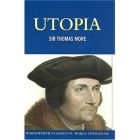Utopia
Utopia (pronounced /juːˈtoʊpiə/) is a name for an ideal community or society possessing a seemingly perfect socio-politico-legal system.[1] The word was invented by Sir Thomas More for his 1516 book Utopia, describing a fictional island in the Atlantic Ocean. The term has been used to describe both intentional communities that attempted to create an ideal society, and fictional societies portrayed in literature. It has spawned other concepts, most prominently dystopia.
The word comes from the Greek: οὐ, "not", and τόπος, "place", indicating that More was utilizing the concept as allegory and did not consider such an ideal place to be realistically possible. The English homophone Eutopia, derived from the Greek εὖ, "good" or "well", and τόπος, "place", signifies a double meaning.
Another version of this concept is found in the Panchaea island, of the "Sacred History" book of Euhemerus, a writer from the 3rd century BC.
Pre-20th century
The City of God (written 413–426 AD) by Augustine of Hippo, describes an ideal city, the "eternal" Jerusalem, the archetype of all Christian utopias.
Tao Hua Yuan,(421) is a utopia for Chinese intellects
Al-Madina al-Fadila, written by Al-Farabi (874-950), where he theorized an ideal state as in Plato's The Republic. Al-Farabi represented religion as a symbolic rendering of truth, and, like Plato, saw it as the duty of the philosopher to provide guidance to the state.
Utopia (1516) by Thomas More
Christianopolis (1619) by Johann Valentin Andreæ, describes a Christian utopia inhabited by a community of scholar-artisans and run as a democracy.
The City of the Sun (1623) by Tommaso Campanella depicts a theocratic and egalitarian society.
New Atlantis (1627) by Francis Bacon.
Erewhon (1872) by Samuel Butler, constitute a satiric romp through a hidden utopia (with dystopian elements) in the mountains of New Zealand.
News from Nowhere by William Morris (1892), Shows "Nowhere", a place without politics, a future society based on common ownership and democratic control of the means of production.[13]
Looking Backward (1888) by Edward Bellamy
Gloriana, or the Revolution of 1900 (1890) by Lady Florence Dixie. The female protagonist poses as a man, Hector l'Estrange, is elected to the House of Commons, and wins women the vote. The book ends in the year 1999, with a description of a prosperous and peaceful Britain governed by women.[14]
[edit] 20th century
A Modern Utopia (1905) by H. G. Wells
Islandia (1942), by Austin Tappan Wright, an imaginary island in the Southern Hemisphere, a utopia containing many Arcadian elements, including a policy of isolation from the outside world and a rejection of industrialism. (In a sequel by Mark Saxton (The Islar, 1969), the Islandians develop a modern air force to fend off hostile communist-allied neighbors, and debate whether to join the UN.)
Walden Two (1948) by B. F. Skinner
Big Planet (1957), by Jack Vance, depicts a world in which attempts by utopian misfits to set up new societies have gone haywire after many revert to savagery and violence. But one city, Kirstendale, sets up a successful order in which citizens constantly shift their status, titles and duties (from servant to aristocrat and back again) according to an elaborate schedule.
Island (1962) by Aldous Huxley follows the story of Will Farnaby, a cynical journalist, who shipwrecks on the fictional island of Pala and experiences their unique culture and traditions which create a utopian society.
Ecotopia: The Notebooks and Reports of William Weston (1975) by Ernest Callenbach, ecological utopia in which the Pacific Northwest has seceded from the union to set up a new society.
Woman on the Edge of Time (1976) by Marge Piercy, the story of a middle-aged Hispanic woman who has visions of two alternative futures, one utopian and the other dystopian.
The Probability Broach (1980), by L. Neil Smith, presents both utopian and dystopian views of present day North America, through alternative outcomes of the American War for Independence.
Always Coming Home (1985), by Ursula K. Le Guin, a combination of fiction and fictional anthropology about a society in California in the distant future.
The Giver (1993), by Lois Lowry, a story about a community in the future where everything is the same; there are no choices, but no pain.
"Uglies (series) (2005), by Scott Westerfield
附件列表
词条内容仅供参考,如果您需要解决具体问题
(尤其在法律、医学等领域),建议您咨询相关领域专业人士。
如果您认为本词条还有待完善,请 编辑
上一篇 外交词汇 下一篇 The die is cast

